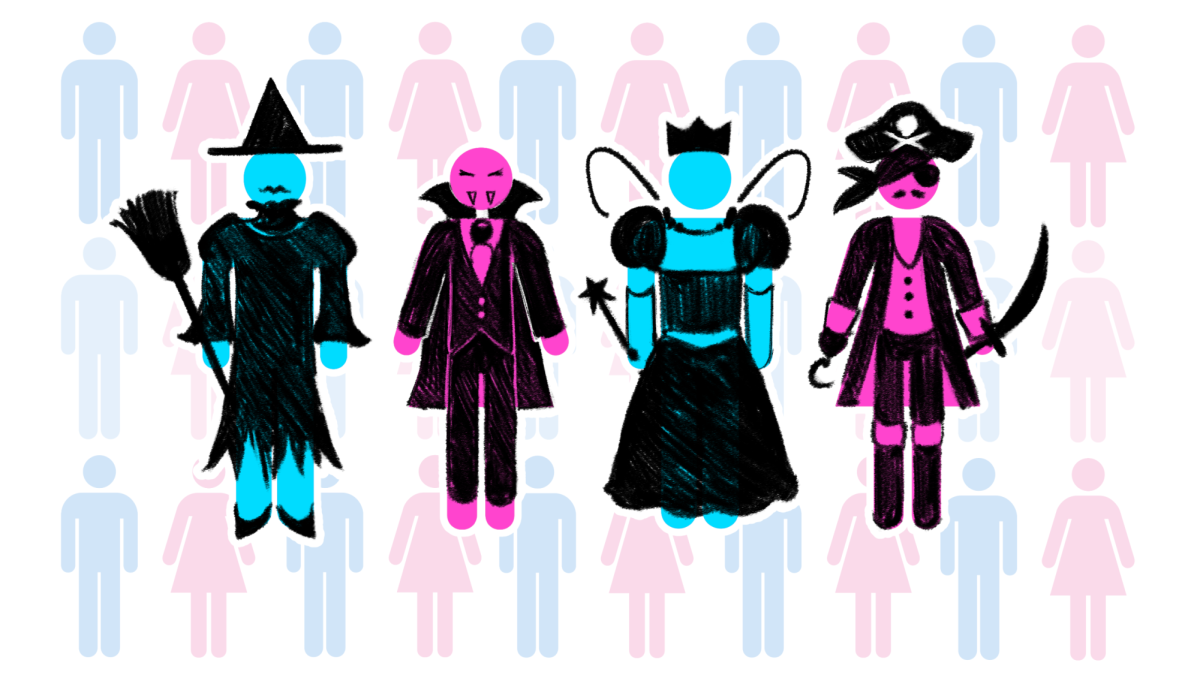This article was initially published on November 1, 2018. Click here to view the original publication.
Halloween’s long history as a rare time of socially acceptable cross-dressing and gender non-conformity remains relevant in 2018. In California, the now-defunct Municipal Code 56.19 criminalized cross-dressing in 1898. It was one of a pack of laws targeting the culture and also social activities of the LGBT+ community. 56.19 was widely defied by drag queens, drag kings, and transgender people — especially in the Halloween tradition of wild street parties in West Hollywood. Though Westridge students may not be so overt, some continue the tradition of Halloween as a joyous expression of nontraditional gender identities.
One Westridge student who identifies as non-binary loves Halloween. When asked about their early experience with Halloween, they reflect, “Dressing up — costumes — you can almost alter who you are.” For them, Halloween is a day of freedom. “You need to have confidence to walk around in everyday life [presenting androgynously], but during Halloween, I could wear something that’s not very form-attentive, because certain aspects of my body make me dysphoric. I prefer [Halloween costumes] that are neither feminine or masculine. Androgynous fashion!” they exclaim with delight.
“[Halloween has] been engrained in our minds as a time when you can dress up and take candy from strangers — the only acceptable time to do that,” Coco G. says, shrugging. As a Westridge sophomore who identifies as “genderqueer, bigender, and genderfluid,” Coco relates. “My parents are like ‘Oh, we don’t understand how you identify,’ and I’m just like ‘Guys… me neither!” However, Coco isn’t opposed to more feminine clothing; “As a kid, I was always, like, a fairy or a princess.” Coco elaborates, “The thing with me and gender expression… is that I still like wearing dresses and dressing up for fancy things… I love doing that.” They lean forward and speak with great anticipation — “I cannot wait for Winter Formal.”
Senior Oona L. is also a self-professed “big fan” of Halloween. “When I was younger, in middle school, I would use Halloween as an opportunity to dress up as men…not understanding that really a lot of that was sort of a deeper seated gender thing,” they say. Even before they fully understood or were ready to express their gender identity, genderqueer, Halloween presented itself as a vehicle for experimentation.
Nick G., a bisexual, transgender teenage boy, says, “Being [transgender] affects me daily. Cisgender people wouldn’t think twice about choosing which bathroom to use or [worry] about passing.” Even Nick, who is an “out [of the closet] and proud” transgender man, worries about judgment by his peers or being harassed. Halloween is his favorite holiday and always has been. On “the only holiday that normalizes anything out of the ordinary,” Nick notes, “No one looks twice at me in a restroom, even though I may be in a totally insane costume.”
Addison Rose Vincent of HuffPost sees Halloween as “an annual event that gives [trans people] permission to be who [they] are, even if it only lasts a few hours.” Jasmine Rodriguez and Sarah McBride, Buzzfeed contributors, also shared their experiences of Halloween gender experimentation. “Halloween gave me the room necessary to explore [my gender] without as much fear,” writes McBride. But Rodriguez writes, “I suppose now that I no longer feel as though I have only one day of the year to be free, it has lost its appeal beyond staying in and watching movies.” Halloween has significance for many transgender people, but some outgrow it or move beyond its circumstances to dress as the gender they feel.
For many, Halloween was a time of free gender expression as young children. However, as they grew into high school students and adults, sometimes coming out of the closet, the importance of Halloween faded into the background. Conversely, the closeted student I spoke to still feels Halloween is important to them. Though for some transgender people, Halloween is an important opportunity to express gender freedom, for others, Halloween may have outlived the need for a safe space in today’s society.




























![Dr. Zanita Kelly, Director of Lower and Middle School, pictured above, and the rest of Westridge Administration were instrumental to providing Westridge faculty and staff the support they needed after the Eaton fire. "[Teachers] are part of the community," said Dr. Kelly. "Just like our families and students."](https://westridgespyglass.org/wp-content/uploads/2025/03/dr.-kellyyy-1-e1748143600809.png)
























